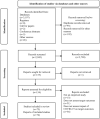A mixed-studies systematic review of the experiences of body image, disordered eating, and eating disorders during the COVID-19 pandemic
- PMID: 35322449
- PMCID: PMC9087368
- DOI: 10.1002/eat.23706
A mixed-studies systematic review of the experiences of body image, disordered eating, and eating disorders during the COVID-19 pandemic
Abstract
Objectives: This systematic review assessed the influence of the COVID-19 pandemic and associated restrictions on body image, disordered eating (DE), and eating disorder outcomes.
Methods: After registration on PROSPERO, a search was conducted for papers published between December 1, 2019 and August 1, 2021, using the databases PsycINFO, PsycARTICLES, CINAHL Plus, AMED, MEDLINE, ERIC, EMBASE, Wiley, and ProQuest (dissertations and theses).
Results: Data from 75 qualitative, quantitative, and mixed-methods studies were synthesized using a convergent integrated approach and presented narratively within four themes: (1) disruptions due to the COVID-19 pandemic; (2) variability in the improvement or exacerbation of symptoms; (3) factors associated with body image and DE outcomes; (4) unique challenges for marginalized and underrepresented groups. Disruptions due to the pandemic included social and functional restrictions. Although most studies reported a worsening of concerns, some participants also reported symptom improvement or no change as a result of the pandemic. Factors associated with worse outcomes included psychological, individual, social, and eating disorder-related variables. Individuals identifying as LGBTQ+ reported unique concerns during COVID-19.
Discussion: There is large variability in individuals' responses to COVID-19 and limited research exploring the effect of the pandemic on body image, DE, and eating disorder outcomes using longitudinal and experimental study designs. In addition, further research is required to investigate the effect of the COVID-19 pandemic on body image and eating concerns among minoritized, racialized, underrepresented, or otherwise marginalized participants. Based on the findings of this review, we make recommendations for individuals, researchers, clinicians, and public health messaging.
Public significance: This review of 75 studies highlights the widespread negative impacts that the COVID-19 pandemic and associated restrictions have had on body image and disordered eating outcomes. It also identifies considerable variations in both the improvement and exacerbation of said outcomes that individuals, researchers, clinicians, and other public health professionals should be mindful of if we are to ensure that vulnerable people get the tailored support they require.
Objetivos: Esta revisión sistemática evaluó la influencia de la pandemia de COVID-19 y las restricciones asociadas en los resultados en imagen corporal, la alimentación disfuncional y los trastornos alimentarios. MÉTODO: Después del registro en PROSPERO, se realizó una búsqueda de artículos publicados entre el 1 de diciembre de 2019 y el 1 de agosto de 2021, utilizando las bases de datos PsycINFO, PsycARTICLES, CINAHL Plus, AMED, MEDLINE, ERIC, EMBASE, Wiley y ProQuest (disertaciones y tesis).
Resultados: Los datos de 75 estudios cualitativos, cuantitativos y de métodos mixtos se sintetizaron utilizando un enfoque integrado convergente y se presentaron narrativamente dentro de cuatro temas: (1) interrupciones debidas a la pandemia de COVID-19; (2) variabilidad en la mejoría o exacerbación de los síntomas; (3) factores asociados con resultados de la imagen corporal y alimentarios disfuncional; (4) desafíos únicos para los grupos marginados y subrepresentados. Las interrupciones debidas a la pandemia incluyeron restricciones sociales y funcionales. Aunque la mayoría de los estudios informaron un empeoramiento de las preocupaciones, algunos participantes también informaron una mejoría de los síntomas o ningún cambio como resultado de la pandemia. Los factores asociados con peores resultados incluyeron variables psicológicas, individuales, sociales y relacionadas con el trastorno alimentario. Las personas que se identificaron como LGBTQ + informaron preocupaciones únicas durante COVID-19. DISCUSIÓN: Existe una gran variabilidad en las respuestas de los individuos a COVID-19 y una investigación limitada que explora el efecto de la pandemia en los resultados de la imagen corporal, la alimentación disfuncional y los trastornos de la conducta alimentaria utilizando diseños de estudios longitudinales y experimentales. Además, se requiere más investigación para investigar el efecto de la pandemia de COVID-19 en la imagen corporal y las preocupaciones alimentarias entre los participantes minoritarios, racializados, subrepresentados o marginados. Basados en los hallazgos de esta revisión, se hacen recomendaciones para individuos, investigadores, médicos y mensajes de salud pública.
Keywords: COVID-19; body image; coronavirus; disordered eating; eating and feeding disorders; health inequality; isolation; lockdown; narrative synthesis; pandemic.
© 2022 The Authors. International Journal of Eating Disorders published by Wiley Periodicals LLC.
Conflict of interest statement
The authors declare no conflicts of interest.
Figures
Comment in
-
Unheard voices: The impact of the COVID-19 pandemic on disordered eating in people with marginalized identities: Commentary on Devoe et al. (2022), Linardon et al. (2022) and Schneider et al. (2022).Int J Eat Disord. 2023 Jan;56(1):68-71. doi: 10.1002/eat.23725. Epub 2022 May 5. Int J Eat Disord. 2023. PMID: 35510676 Free PMC article.
References
-
- Acle, A. , Cook, B. J. , Siegfried, N. , & Beasley, T. (2021). Cultural considerations in the treatment of eating disorders among racial/ethnic minorities: A systematic review. Journal of Cross‐Cultural Psychology, 52(5), 468–488. 10.1177/00220221211017664 - DOI
-
- * Akgül, S. , Akdemir, D. , Nalbant, K. , Derman, O. , Alan, B. E. , Tüzün, Z. , & Kanbur, N. (2021). The effects of the COVID‐19 lockdown on adolescents with an eating disorder and identifying factors predicting disordered eating behaviour. Early Intervention in Psychiatry. 10.1111/eip.13193 - DOI - PMC - PubMed
-
- Armijo‐Olivo, S. , Stiles, C. R. , Hagen, N. A. , Biondo, P. D. , & Cummings, G. G. (2012). Assessment of study quality for systematic reviews: A comparison of the Cochrane collaboration risk of bias tool and the effective public health practice project quality assessment tool: Methodological research. Journal of Evaluation in Clinical Practice, 18(1), 12–18. 10.1111/j.1365-2753.2010.01516.x - DOI - PubMed
-
- * Baceviciene, M. , & Jankauskiene, R. (2021). Changes in sociocultural attitudes towards appearance, body image, eating attitudes and behaviours, physical activity, and quality of life in students before and during COVID‐19 lockdown. Appetite, 166, 105452. 10.1016/j.appet.2021.105452 - DOI - PMC - PubMed
Publication types
MeSH terms
LinkOut - more resources
Full Text Sources
Medical


